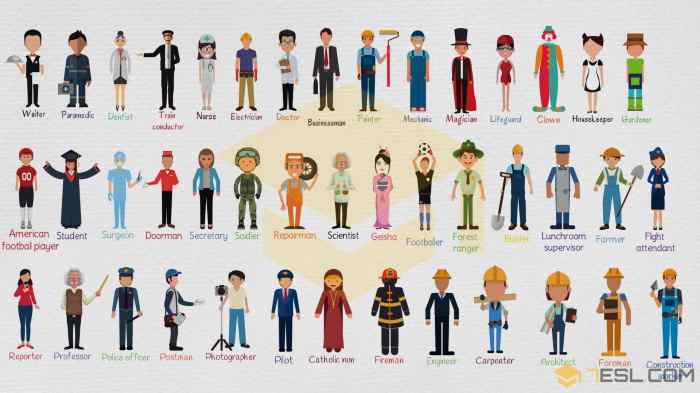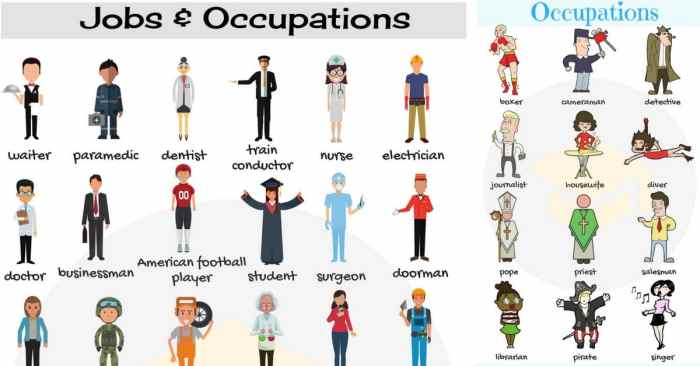Occupations that end with ist – Occupations that end with -ist, such as analyst, biologist, and chemist, offer a diverse range of career opportunities. This comprehensive guide delves into the etymology, skills, and job market trends of these professions, providing valuable insights for aspiring professionals.
Occupations that end with ‘ist’
The suffix ‘-ist’ is added to words to indicate a person who specializes in a particular field or practice. It often denotes a profession or occupation that requires specialized knowledge or skills. Occupations ending with ‘-ist’ encompass a wide range of industries and disciplines, including healthcare, education, technology, and the arts.
Here is a comprehensive list of occupations that end with ‘-ist’:
Healthcare
- Anesthesiologist
- Cardiologist
- Dentist
- Endocrinologist
- Gastroenterologist
- Neurologist
- Obstetrician
- Ophthalmologist
- Pathologist
- Pediatrician
- Pharmacist
- Physiotherapist
- Psychiatrist
- Radiologist
- Surgeon
Historical Origins and Etymology of ‘-ist’ Occupations

The ‘-ist’ suffix has a rich history and etymology, with roots in various languages and cultures. Its origins can be traced back to ancient Greece, where the suffix ‘-istes’ was used to denote a person who practices or specializes in a particular field or activity.
Over time, the ‘-ist’ suffix spread to other languages, including Latin and English. In Latin, the suffix ‘-ista’ was used to form nouns denoting a person who practices or advocates a particular doctrine or belief. In English, the ‘-ist’ suffix has been widely adopted to create job titles that indicate a person’s profession or specialization.
Cultural and Societal Factors
The development of ‘-ist’ job titles has been influenced by a number of cultural and societal factors, including:
- The rise of specialized knowledge and expertise in various fields
- The need for specialized workers to meet the demands of a complex and evolving society
- The desire to distinguish between different types of professionals and their areas of specialization
Education and Training Pathways for ‘-ist’ Professions

To become an ‘-ist’ professional typically requires a combination of formal education and practical training. The specific requirements vary depending on the field and the level of expertise required.
Most ‘-ist’ professions require a bachelor’s or master’s degree in a relevant field. Common degrees include science, engineering, technology, and the humanities. Some professions may also require additional specialized training or certification.
Certification and Licensing
In many fields, certification or licensing is required to practice as an ‘-ist’ professional. Certification demonstrates that an individual has met certain standards of knowledge and skill. Licensing is typically required by law and allows professionals to practice in a specific jurisdiction.
The process for obtaining certification or licensing varies depending on the field. In some cases, it may involve passing an exam, completing a training program, or gaining a certain number of years of experience.
Institutions and Programs
There are numerous institutions and programs that offer training in ‘-ist’ professions. These include universities, colleges, vocational schools, and professional organizations.
When choosing a training program, it is important to consider the reputation of the institution, the curriculum, and the cost. It is also important to make sure that the program meets the requirements for certification or licensing in the field you are interested in.
Skills and Competencies Required for ‘-ist’ Roles
Success in ‘-ist’ occupations demands a multifaceted skillset encompassing technical proficiency, analytical thinking, and interpersonal finesse. These roles require individuals who can seamlessly blend specialized knowledge with soft skills to navigate diverse work environments and excel in their respective fields.
To provide a comprehensive overview of the skills and abilities necessary for ‘-ist’ professions, the following table presents a comparative analysis of different occupations:
Skills and Abilities for Different ‘-ist’ Professions
| Occupation | Technical Skills | Analytical Skills | Interpersonal Skills |
|---|---|---|---|
| Analyst | Data analysis, statistical modeling, programming | Problem-solving, critical thinking, interpretation | Communication, teamwork, presentation |
| Journalist | Writing, research, interviewing | Information gathering, analysis, storytelling | Communication, empathy, adaptability |
| Dentist | Oral health diagnosis, treatment planning, surgery | Problem-solving, decision-making, hand-eye coordination | Patient communication, empathy, professionalism |
Beyond technical expertise, ‘-ist’ roles also value soft skills and interpersonal qualities. Effective communication, active listening, and empathy enable these professionals to connect with clients, colleagues, and stakeholders. Emotional intelligence and adaptability are crucial for navigating challenging situations and fostering positive relationships.
Job Market Trends and Employment Outlook for ‘-ist’ Occupations
The job market for ‘-ist’ occupations is influenced by various factors, including technological advancements, economic conditions, and societal changes. In recent years, the demand for ‘-ist’ professionals has been growing due to increased specialization and the need for skilled workers in various industries.
From scientists to pharmacists, there’s a wide range of occupations that end with the suffix “ist.” If you’re interested in learning more about one of these fields, such as fitness training, you can check out resources like tym the trainer answer key . These resources can provide valuable insights into the specific roles and responsibilities associated with these professions.
The projected growth or decline in employment opportunities for ‘-ist’ occupations varies depending on the specific field. However, overall, the outlook is positive for many ‘-ist’ professions, as they are expected to remain in high demand due to their specialized knowledge and skills.
Factors Influencing Demand
- Technological advancements have led to increased demand for ‘-ist’ professionals in fields such as data science, artificial intelligence, and cybersecurity.
- Economic growth and globalization have created new opportunities for ‘-ist’ professionals in international business, finance, and consulting.
- Societal changes, such as an aging population and increased awareness of mental health, have increased the demand for ‘-ist’ professionals in healthcare, social work, and psychology.
Case Studies and Examples of ‘-ist’ Occupations in Action
‘-ist’ occupations play crucial roles in various industries, contributing significantly to society. Here are some real-world examples and case studies:
Environmentalists in Action
- Environmentalists played a pivotal role in the campaign against deforestation in the Amazon rainforest, raising awareness and advocating for sustainable practices.
- Marine biologists study and protect marine ecosystems, contributing to the conservation of endangered species and ensuring the health of our oceans.
Artists in Action
- Artists, such as painters, sculptors, and musicians, create and express their vision, enriching our cultural landscape and inspiring creativity.
- Fashion designers shape trends, pushing the boundaries of style and aesthetics, and contributing to the fashion industry’s growth.
Scientists in Action
- Scientists, such as physicists, chemists, and biologists, conduct research and make discoveries that advance our understanding of the world and lead to technological breakthroughs.
- Data scientists analyze and interpret vast amounts of data, providing insights that inform decision-making and drive innovation.
Technologists in Action
- Software engineers design, develop, and maintain computer systems, shaping the digital landscape and enabling technological advancements.
- Web developers create and manage websites, providing access to information and services for millions of users.
Table: Comparison of ‘-ist’ Responsibilities and Work Environments, Occupations that end with ist
| Occupation | Responsibilities | Work Environment |
|---|---|---|
| Environmentalist | Researching environmental issues, advocating for sustainable practices, and protecting ecosystems. | Fieldwork, laboratories, and office settings. |
| Artist | Creating and expressing artistic vision through various mediums, such as painting, sculpting, and music. | Studios, galleries, and performance venues. |
| Scientist | Conducting research, analyzing data, and making discoveries in various scientific fields. | Laboratories, research institutions, and field sites. |
| Technologist | Designing, developing, and maintaining computer systems and software applications. | Office settings, development labs, and data centers. |
Emerging Trends and Future Prospects for ‘-ist’ Occupations
The future of ‘-ist’ occupations is poised for significant transformation, driven by emerging technologies and advancements. These advancements will reshape existing roles and create new and innovative opportunities for professionals in various fields.
One key trend is the rise of artificial intelligence (AI) and machine learning (ML). These technologies have the potential to automate certain tasks, freeing up ‘-ist’ professionals to focus on more complex and value-added activities. For example, in the legal field, AI-powered tools can assist with document review and analysis, allowing attorneys to spend more time on strategic decision-making.
Another emerging trend is the increasing demand for specialized knowledge and skills. As technology advances and industries become more complex, employers will seek ‘-ist’ professionals with specialized expertise in specific areas. This may lead to the creation of new sub-specialties within existing professions.
Additionally, the growing emphasis on data analytics and data-driven decision-making is creating new opportunities for ‘-ist’ professionals with strong analytical skills. In fields such as finance and healthcare, professionals with the ability to interpret and analyze data will be in high demand.
New and Innovative Roles
The convergence of emerging technologies and evolving industry needs is giving rise to new and innovative roles within ‘-ist’ professions. Here are a few examples:
- Data Scientist:Professionals who combine statistical and programming skills to analyze and interpret data, providing insights for decision-making.
- Cybersecurity Analyst:Experts who specialize in protecting computer systems and networks from cyber threats.
- UX Designer:Professionals who design and evaluate user interfaces to ensure a positive user experience.
- Blockchain Developer:Professionals who specialize in developing and implementing blockchain technology solutions.
- Forensic Accountant:Accountants who specialize in investigating financial crimes and providing expert testimony in legal proceedings.
Potential Future Trends and Opportunities
The future holds exciting prospects for ‘-ist’ professionals. Here is a table outlining potential future trends and opportunities:
| Trend | Opportunity |
|---|---|
| Increased Automation | Focus on higher-level thinking and problem-solving |
| Demand for Specialized Skills | Opportunities for professionals with deep expertise in specific areas |
| Data Analytics and Decision-Making | High demand for professionals with strong analytical and data interpretation skills |
| New and Innovative Roles | Creation of new job titles and responsibilities driven by emerging technologies |
| Global Collaboration | Opportunities for collaboration and knowledge sharing across borders |
Helpful Answers: Occupations That End With Ist
What is the significance of the-ist suffix in job titles?
The -ist suffix denotes a person who specializes in a particular field or subject matter, indicating expertise and knowledge in that area.
What are some common occupations that end with-ist?
Analyst, biologist, chemist, dentist, journalist, linguist, pharmacist, physicist, therapist, and many more.